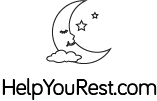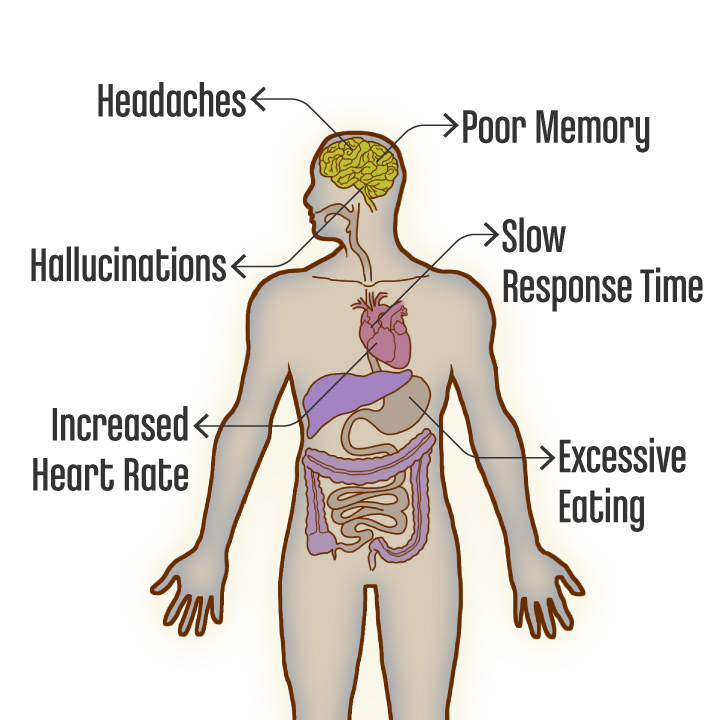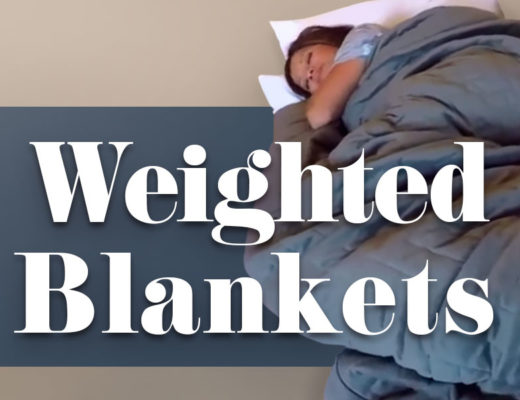So What is the Best Time To Fall Asleep, and What Happens if I Don’t Get Enough Sleep?
Every one of us knows we should be getting more sleep for better health, so we consult with doctors and do everything we can to achieve a more rejuvenating rest. But despite whatever lifestyle changes you make, whatever sleep aids you adopt and use, you may still find yourself struggling to drift off at night and feeling sluggish in the morning. While you’re examining what’s right and wrong about your habits, don’t overlook one simple yet crucial factor in sleep quality: timing.
What is the best time to fall asleep? According to the National Sleep Foundation, the target time would be somewhere between 8 p.m. and midnight, depending on the time of year. This variable also lines up with when you plan to wake up in the morning, but in general, it’s best to go to sleep after sundown, to better align with your circadian rhythm.
There are many different methods you can use to determine when you should sleep to best ensure you get all the rest you need, but it’s equally important to understand all the factors and variables that can affect your quality of sleep (positive and negative) and how much you may get. We’ll dive into how your circadian rhythm works, good sleep habits, and the effects of getting too much (and too little) sleep. So change the sheets, fluff your pillow, curl up under your favorite blanket, and let’s get sleepy.
Circadian Rhythm
If you’ve ever heard someone refer to their natural alarm clock, they’re probably talking about their circadian rhythm. Essentially it’s a biological process that determines when we need to rest relative to a twenty-four-hour day. It’s known to exist not only in humans but in other lifeforms, like plants, as well.
We are incredibly responsive to light, and that’s where the circadian rhythm comes into play: it makes us feel more awake when we’re in a light-filled environment and tired when it becomes dark. When responding to natural sunlight, it becomes stronger and weaker throughout the day as the sun travels across the sky.
It’s not as black and white as the sun rising and setting, though those are the biggest cues we get to wake up and eventually sleep every day. Environment and habits can create a second drowsy period during the day (usually in the early afternoon or evening). But generally speaking, the biggest influence is light and a lack thereof.
When we’re told that we should aim for seven hours of sleep a night, that’s in line with our circadian rhythm. However, the biological process fluctuates as we age, dictating how much sleep our bodies need. The seven-hour figure applies to most of us (ages twenty-five through sixty). Those who are younger need much more sleep, while those who are older only need a few. The Center for Disease Control’s recommendations break it down into fine specifics here.
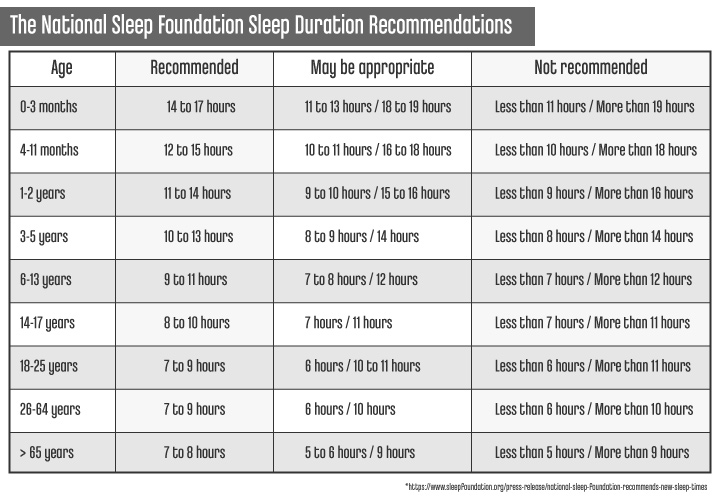
So When Should You Sleep?
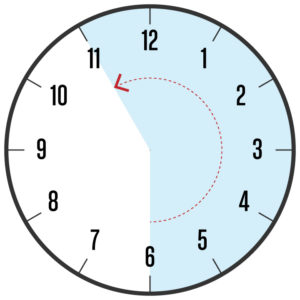
It’s not as easy as conking out once the sun is down (if it were, you’d likely get too much sleep). However, there’s a quick trick to determine when to call it a night. First, pick the time you want to wake up, then count back the number of hours recommended for your age group. You should be in bed at least thirty minutes before then, though it doesn’t hurt to tack on an extra hour instead. The National Sleep Foundation link at the beginning of this article explains it further.
Let’s use the seven-hour figure as an example. Say you want to wake up around five o’clock. Ideally, you should be in bed so that you can fall asleep as close to ten as possible. Of course, this isn’t an exact method, and all sorts of variables can affect how easily you’ll fall asleep.
A few broad windows of time have been proposed. Those often proposed by medical professionals usually fall between the 8 PM and midnight range mentioned earlier. Again, it’s not precise, but it’s understood that your quality of sleep weakens as the night goes on, so this range gives you plenty of leeway.
Best Sleep Headphones
Signs to Look For
While the usual day/night cycle is a good baseline, your body sends signals telling you when it needs rest. Some are pretty obvious, like an inability to concentrate or bodily pains, more subtle hints could serve as early warnings. Try to be aware of things like:
Headaches
It’s easy to pin them on something else (like staring at a screen or bright lights), but sometimes a headache occurs when your body is exhausted. The pressure this causes translates into stress that becomes pain throughout your body. If you experience headaches or migraines at night, you may be staying up too late.
Excessive Eating
Regardless of when they happen, food cravings when you aren’t truly hungry are sometimes your body’s way to try and regain energy when the amount of sleep you’ve been getting isn’t enough. However, this method is not only ineffective, but it’s also dangerous for your diet. Similar to depression, poor sleep can lead to cravings of sweet and fatty foods.
Increased Heart Rate
Your heart shouldn’t be pounding when you aren’t engaging in strenuous activity, but it’s a common side effect of sleep deprivation. It can also be indicative of unrelated but serious problems, so it definitely shouldn’t be ignored.
Slow Response Time
Sleep gives your brain a chance to recharge (though it doesn’t really rest—at least not entirely). How you process the world around you changes when you’re out of sync with your circadian rhythm, including sight, sound, and physical actions.
Poor Memory
One of the functions of sleep is to help commit things to memory, both short and long. Without regular sleep, even simple things are quickly forgotten (“Did I lock the door this morning?” “Where did I leave the keys last night?”). It can also take longer for you to recall things you’ve known for years and information you use every day. This fuzziness or fog gets worse the longer you go without proper sleep.
Hallucinations
Oftentimes we think of hallucinations as being totally engulfing moments of unreal sights and sounds, but that’s only in extreme cases. Auditory and visual hallucinations can happen in brief flashes and be as simple as a voice heard in the distance or the sight of something in the corner of your vision.
The takeaway is this: your body will tell you what it needs and when something is missing, but you need to pay attention to the signs and follow through to correct things. Expecting problems to correct themselves, especially when you aren’t sure of the source, is dangerous. Keep tabs on all the signals your body is sending and talk to your doctor.
What’s The Best Direction To Sleep
Routine Makes A Difference
Everyone has their own rhythms outside of sleeping, too. They’re forged by our daily routines and the responsibilities we carry from day to day. Things like eating and preparing meals, going to, performing, and returning from work, and doing chores, all play a role in shaping when we feel the need to rest.
Our brains are great at recognizing patterns, including when we carry out major tasks and for how long. Over time our schedules become ingrained into our cycle and partially dictate when we should be alert and when we can safely relax. If you’re able to regulate your daily activities your brain will be able to recognize when bedtime is approaching.
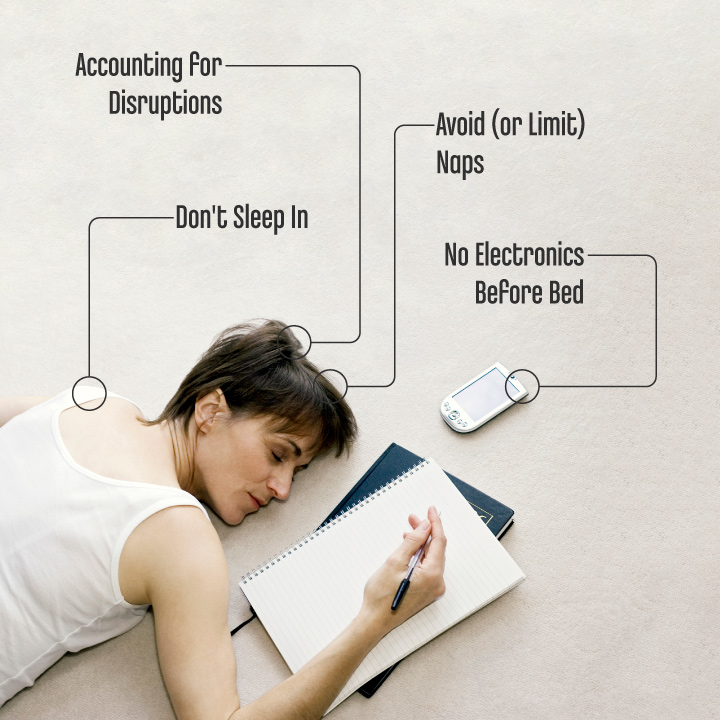
It’s not about meticulously planning every little thing and sticking fiercely to timetables—that in and of itself would be incredibly exhausting. Likewise, our commitments to things like work aren’t always set in stone and can change from week to week or day to day. The important thing is to do the big things consistently, giving yourself a little leeway around when you actually do them.
When you choose to carry out activities is just as important as the sequence you do them in when it comes to training your brain. Think of a mental checklist: “Once I do this, this, and this, I’ll be ready for bed.”
Accounting for Disruptions
It’s not difficult to throw your circadian rhythm out of whack, even on accident. When you do, you’ll need to reset it. But what if the disruption isn’t the result of a bad habit or deliberate choice?
Sleep hygiene is the practice of preparing for sleep and how you set up your bedroom. It’s less about establishing ideal conditions and more about avoiding specific pitfalls. These changes may seem small but make a big difference.
Don’t Sleep In
As much as we may like staying tucked in on a Saturday morning, that luxury comes at a cost. A healthy sleep schedule hinges on consistency. Try to wake up around the same time every day and set an alarm if you have one.
Just because you have a day off or a late shift doesn’t mean your body recognizes this as free time, nor can it readily adapt to the decision to laze about. Even if you don’t have something to do, it’s important to physically get out of bed on time.
Avoid (or Limit) Naps
This one seems simple on the surface: if you take a nap during the day, you’re essentially recharging your body before you’d normally crawl into bed. So if you just don’t nap, you should be fine, right? Well, not necessarily.
Naps can be difficult to eliminate entirely, especially if they’ve been part of your regular routine for a long time. That’s why it’s recommended that you should only nap for half an hour at a time if you choose to nap at all. This allows you to rest without falling into a deep sleep that can otherwise throw your sleep schedule into chaos.
No Electronics Before Bed
Electronic devices that feature screens emit a certain kind of light that disrupts our circadian rhythm. It’s sometimes referred to as the blue light, though what we see isn’t necessarily that color. There have been numerous studies in the past that point to the same conclusion: using your tablet, computer, television, or smartphone close to bedtime keeps your brain activity spiked for longer, making it much harder for you to fall asleep.
If you can unplug an hour before bed, you’ll be in a much calmer state of mind to fall asleep. There are products and apps available that allege to filter screen lights so that they don’t have this negative effect, but it’s difficult to know which ones actually work and which ones don’t. Instead of taking chances and potentially wasting time and money, it’s better to just cut down on screen time
“But I Can’t Sleep! I Have Too Much To Do!”
The largest group of people who suffer from too little sleep are between the ages of 18 and 50 (according to this 2013 Gallup poll). Within this group, the primary reasons for sleep deprivation are work and school responsibilities, like studying all night and working late shifts. As important as it is to meet your commitments, doing so shouldn’t supersede your health and wellbeing.
You may be thinking that going without sleep for a full day isn’t that big of a deal. Besides the previously listed side effects, refusing sleep for a full day has been described as creating a feeling similar to having the flu or being drunk. Even if you think it doesn’t sound so bad, it gets much worse the longer you stay awake.
Let’s continue to look at a twenty-four hour period. Eventually, despite your best efforts, your body will try to sleep. This could be a crash lasting for hours or an incredibly brief (as in, a few seconds long) periods you may not even notice. Since either result is out of your control, they could happen at any moment, regardless of what you’re doing, potentially leading to serious injury or death.
You may be able to resist drowsiness at first, but the longer you go the more severe the side effects will be, even if you use stimulants like caffeine. Eventually, you’ll need to sleep, and no matter how much you resist, your body’s needs will eventually win.
Too Much or Too Little Sleep
Seven hours is the magic number, but don’t worry if you miss it once or twice a week. What you should avoid is consistently getting too much or too little sleep. Both can be equally dangerous over time if left unchecked.
Besides feeling tired throughout the day, sleep deprivation has a lot of side effects that can go unnoticed, at least at first: memory loss, heart strain, and high blood pressure, increased feeling of depression, increased risk of developing diabetes, shortened attention and focus, and a sense of physical weakness are serious problems that can arise in those who don’t get enough sleep. Many of these issues lead to greater problems as well, like poor hand-eye coordination and balance.
Too much sleep isn’t discussed nearly as much, but the threat it poses is still very real. Surprisingly, the side effects are almost identical to sleep deprivation. The adage “there’s no such thing as too much sleep” doesn’t hold much water health-wise; you may feel comfortable sleeping in, but when it becomes a habit your body notices.
The simplest way to hit the seven-hour goal is to set an alarm. Being awoken suddenly isn’t harmful if you’ve already gotten enough sleep; and if you set an alarm every day you may notice yourself instinctively waking up minutes before it goes off.
As with all lifestyle changes, you should expect a period of trial and error as you experiment with different tips and bedtimes. The tricky thing about habits is that they take time to form, but once you do they become like second nature. Give yourself time to make gradual changes and soon you’ll be sleeping at just the right time for you.
